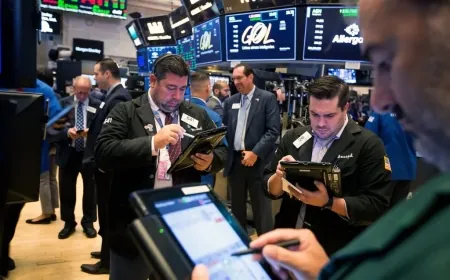SoftBank Shares Plunge 19% in Biggest Drop Since 1998 IPO
SoftBank Group's stock drops 19% in its worst decline since 1998. Market turmoil and AI investment challenges contribute to significant losses

SoftBank Group Corp. experienced its largest stock drop since its 1998 IPO on Monday, with shares plummeting 19%. This sharp decline erased $15 billion in value and extends its losses for the September quarter to 38%. If the trend continues, it will be the most significant drop since 2001. This downturn occurs as SoftBank's founder, Masayoshi Son, prepares to invest heavily in artificial intelligence (AI) and semiconductor technologies.
SoftBank’s AI Investments Under Scrutiny
SoftBank’s major investments in AI and semiconductor sectors have recently come under scrutiny. The initial excitement surrounding AI is fading as investors now seek concrete revenue and profit from these technologies. Bloomberg Intelligence analysts point out that while SoftBank’s AI investments have potential, the path to profitability may be fraught with challenges and high execution risks.
Impact of Global Market Conditions on SoftBank
Japan’s Topix and Nikkei 225 indices fell by 12% on Monday, influenced by a stronger yen, tighter monetary policies, and worsening US economic conditions. The rise of the yen has made Japanese exports more expensive, adding pressure to Japanese companies, including SoftBank.
SoftBank is set to release its quarterly financial results on Wednesday. Analysts anticipate a modest profit, but given recent market volatility, there is considerable caution. The upcoming results will provide further insight into SoftBank’s performance during this turbulent period.
Market Reactions and Future Outlook
Analyst Kirk Boodry from Astris Advisory suggests that the recent market selloff might be overdone. He compares the current situation to the early COVID-19 pandemic when SoftBank’s stock faced extreme discounts. The discount to net asset value has now widened to 57%, reflecting increased market volatility and risks associated with SoftBank’s investments.
The broader market’s instability, driven by geopolitical tensions and currency fluctuations, is contributing to the volatility in tech stocks. These factors are leading to heightened investor concerns and impacting confidence in technology investments.
Strategic Adjustments Ahead
As SoftBank navigates through these challenging times, the company will need to make strategic adjustments. Emphasizing clear performance metrics and profitability in its AI investments will be crucial. The Vision Fund, which invests in numerous tech startups, may also need to reassess its portfolio to better manage risks and optimize returns. Adjustments might involve diversifying investments or focusing on areas with more immediate growth potential.
Investors and analysts will be closely watching how SoftBank adapts its strategies in response to the current market conditions. The decisions made in the coming weeks will likely influence the company’s future direction and its role in the technology investment landscape.
Also Read: Top 3 High-Yield Dividend Stocks to Invest $5,000 in 2024

































































